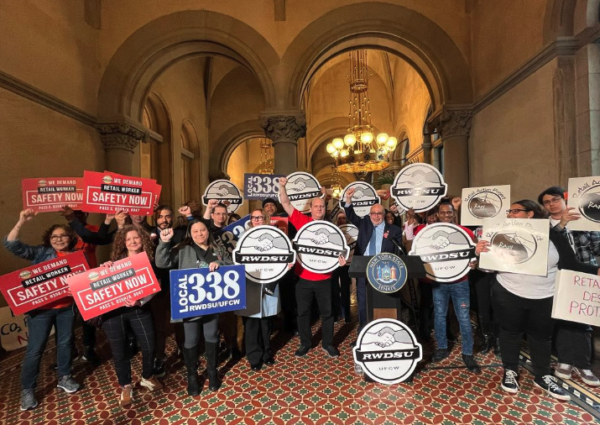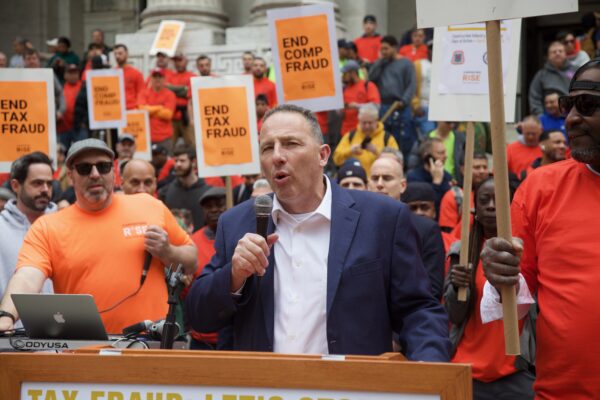July 19, 2013
By Joe Maniscalco
New York, NY – Supporters of the city’s nine-month-old living wage legislation are hailing the contentious bill passed back in September as an unadulterated success this week – and calling on the next administration to soon broaden its scope to include more workers. (Watch Video)
More than 12,000 workers are already benefiting from the measure that sets the hourly rate associated with publicly subsidized building projects at between $10.20 with benefits, and $11.75 without benefits, according to a newly-released report from the Retail, Wholesale and Department Store Union [RWDSU]. Now, however, members of the broadly-based coalition of elected officials, labor unions and clergy who helped get the measure passed in the face of staunch opposition from outgoing Mayor Michael Bloomberg, are setting their sights on achieving more.
“The legislation really sets the stage for a rebalancing of economic development under the next mayor,” said Paul Sonn, legal co-director for the National Employment Law Project, and a key figure in crafting of the living wage legislation.
Sonn made his remarks at an RWDSU-led rally held Thursday morning, July 18, on the steps of City Hall to announce the new report.
Bronx Borough President Ruben Diaz Jr. pointed to the publication as vindication, and chided those on the right and the left, who argued respectively that living wage legislation would be both a jobs killer and a toothless measure.
“We have been proven right and the doubters have been proven wrong,” Borough President Diaz said. “The proof is in the data.”
RWDSU President Stuart Appelbaum called New York City’s living wage legislation, which kicks in on building projects receiving $1 million or more in public assistance – the “strongest and most robust living wage legislation in the country.”
The RWDSU report finds that far from scaring off developers, the enactment of living wage legislation has not affected the amount of applications the city’s Industrial Development Agency has received from builders hoping to obtain public assistance for their enterprises.
In an exclusive interview with LaborPress, Appelbaum said that passing living wage legislation established a “principle.”
“We expect to expand upon this,” the RWDSU president said. “Our goal is that with a new administration, we will finally discard old-fashion notions of economic development that provides money to developers while at the same time condemning workers to lives of poverty.”
Outgoing City Councilman G. Oliver Koppell, the leading sponsor of living wage legislation representing District 11 in the Bronx, called the current measure a “good start” and charged his returning colleagues in the New York City Council to make sure that the law is, indeed, expanded.
“I hope that the next mayoral administration will pass a living wage bill that will apply to everyone,” Councilman Koppell said. “Anyone who does business in a government supported project benefits from government support. And government should not be supporting enterprises that don’t pay their workers enough to support a family. I hope we will only go further. I charge you to continue and get this law even more broadly applied.”
Clergy members who were also involved in the fight to pass living wage legislation – as well as paid sick leave and minimum wage – were even more direct in their calls for present legislation to be expanded.
“We are satisfied with the progress, but the faith-based leaders will not stop until all all New Yorkers have a living wage were we didn’t have to compromise,” said Rev. Dr. Ray Rivera, of the Latino Pastoral Action Center in the Bronx. “Where paid sick leave we didn’t have to compromise, where minimum wage we didn’t have to compromise. Yes, we dealt with it, but our goals are still the same goals. And that is wages where New York residents that are low wage [workers] can support their families, can achieve stability, and can achieve productivity just like all other residents.”
Dr. Robert Waterman, pastor of the Antioch Baptist Church in Brooklyn, said that as far as living wage legislation is concerned, the “test is over,” and that every candidate currently vying for powerful political office will do well to remember that.
“We will continue to fight,” the Brooklyn pastor said. “It does not stop here. If living wage is not on your agenda, you will not get in.”
In reiterating her support for living wage legislation, Councilwoman Melissa Mark-Viverito, representing District 8 in Manhattan, pointed to staggering and shameful statistics that finds 26 percent of the city’s children and 20 percent of its adults living in poverty.”
“New York City has the largest income gap in this nation,” Councilwoman Mark-Vivertio said. “As legislators, we have a moral imperative to use the power of the city – through legislation, through economic development policies – to ensure that we uplift members of our community. When we invest in our workers by giving them higher wages, we are investing in the economic prosperity of New York City.”
Mayor Bloomberg is still challenging living wage legislation in the courts. A federal court dismissed Bloomberg’s suit earlier this month saying that the allegations were “clearly insufficient to establish standing.”



